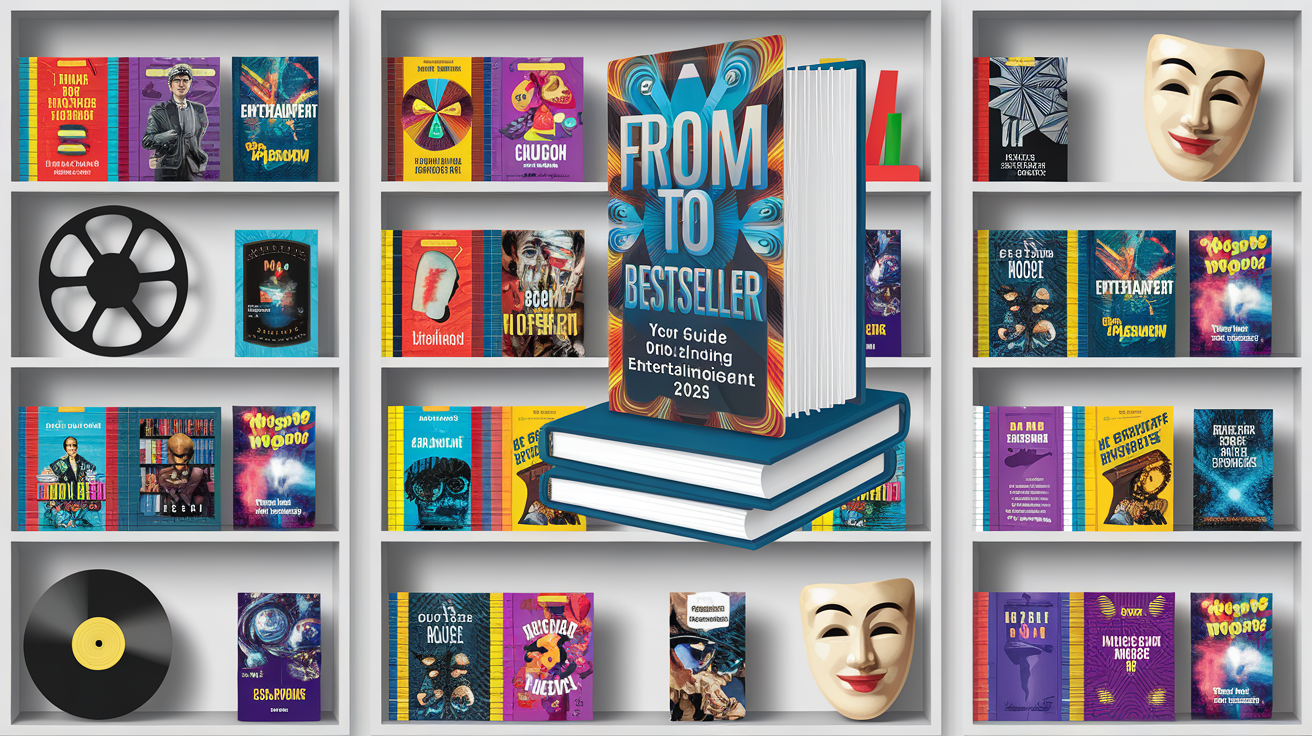From Idea to Bestseller: Your Guide to Publishing Entertainment Books in 2025
So, you've got a killer story bouncing around in your head maybe it's a thrilling sci-fi epic, a swoon-worthy romance, or a chilling horror tale that will keep readers up all night. Publishing a book in the entertainment genre feels like a dream, right?But let's be real, the path from that initial spark to holding your own published book can seem a little daunting. One thing to keep in mind: in 2025, with the digital landscape evolving faster than ever, understanding how to navigate this world is crucial if you want your entertainment masterpiece to not just be seen, but to truly captivate an audience.
The "entertainment genre" is a huge umbrella, encompassing everything from gripping thrillers and imaginative fantasy worlds to heartwarming romances and mind-bending mysteries. Each of these sub-genres has it's own unique flavor, audience expectations, and even specific publishing nuances. Getting it right means understanding what makes readers tick within your chosen niche. Its about crafting an immersive experience that transports them, makes them feel something, and keeps them coming back for more.
This isn't just about writing a great story, though. It's also about understanding the business side of things, from identifying your target market to knowing how to effectively market your book once its ready. The good news is, you don't have to go it alone. With the right tools and knowledge, you can absolutely make your publishing dreams a reality.
Mastering the Art of Your Entertainment Niche

Before you even think about hitting 'publish,' you've got to get intimate with your chosen entertainment niche. What makes a Science Fiction reader pick up a new book?What are the expectations for a Historical Fiction novel?The truth is, each genre has it's own set of unspoken rules and reader desires. For instance, a Fantasy reader might be looking for intricate world-building and epic quests, while a Romance reader is probably more invested in character development and the emotional journey of the protagonists.
Think about the core elements that define your genre. Is it fast-paced action for a Thriller?Deep psychological suspense for a Mystery?Or perhaps the exploration of societal issues for a Dystopian novel?Understanding these fundamental building blocks will guide your writing process and ensure your book resonates with the right audience. Its like speaking the same language as your potential readers. What I've found is that authors who deeply understand their genre's tropes and conventions, and then creatively play within or subvert them, are the ones who truly stand out.
On top of that, pay attention to whats trending. While you should always write what you love, being aware of popular themes or reader interests in genres like Young Adult (YA), New Adult, or Paranormal Romance can give you a competitive edge. However, the key is to infuse your unique voice and perspective, rather than simply chasing trends. Your passion for the story will shine through and attract readers who connect with your authentic vision.
Crafting an Irresistible Book That Sells

Now that you're a genre guru, let's talk about making your book impossible to put down. This goes beyond just having a good plot; it's about the entire package. Your book cover, for example, is your first handshake with a potential reader. Most people don't realize in the entertainment genres, especially, a cover needs to be visually striking and immediately communicate the essence of your story. A fantasy cover might feature dragons or epic landscapes, while a thriller cover could evoke suspense and danger.
Look, beyond the cover, the writing itself needs to be top-notch. This means tight pacing, compelling characters, and crisp prose. Dialogue should sound natural and reveal character, while descriptions should be vivid enough to transport the reader into your world without bogging down the narrative. What works in a sprawling Science Fiction novel might not work in a concise Historical Fiction piece. You need to calibrate your writing style to the demands of your genre.
Also, consider the reader experience from start to finish. This includes a well-structured outline that keeps readers engaged, a gripping introduction that hooks them immediately, and a satisfying conclusion that leaves a lasting impression. For many entertainment genres, like Adventure or Supernatural, a cliffhanger ending or a twist that makes them rethink everything can be incredibly effective. Its about building anticipation and delivering on your promise.
Navigating the Publishing Maze: Traditional vs. Indie
When it comes to getting your entertainment book into the hands of readers, you've got two main avenues: traditional publishing and independent (or indie) publishing. Each has it's pros and cons, and the "best" path really depends on your goals, your timeline, and your personality. Traditional publishing often involves finding a literary agent, submitting to publishers, and if accepted, they handle editing, cover design, printing, distribution, and marketing. This can lend a certain prestige and reach, but it also means relinquishing a lot of control and often waiting a significant amount of time.
Indie publishing, on the other hand, puts you in the driver's seat. You control everything from the editing and cover design to setting your price and choosing your distribution platforms (like Amazon Kindle Direct Publishing, Kobo, Apple Books, etc. ). This offers incredible flexibility and faster time-to-market, which can be a huge advantage in the fast-paced entertainment market. You also get to keep a much larger percentage of the royalties. However, it means you're responsible for all the costs and the learning curve associated with each step.
What I've found is that many authors in popular entertainment genres are finding great success with indie publishing because it allows them to connect directly with their audience and respond quickly to market shifts. Genres like Magical Realism or Biography often benefit from the personal touch and direct reader engagement that indie publishing make easiers. It's about building your own brand and community.
How FastRead Helps You Create Entertainment Content
You might be surprised to know truth is, creating quality content used to take forever. But FastRead changes the game entirely. Whether you're writing about entertainment, technology, business, or any other topic, FastRead's AI handles the heavy lifting. It can help you brainstorm ideas, generate outlines, draft chapters, and even suggest cover concepts that align perfectly with your chosen genre. Think of it as your ultimate writing partner, accelerating the process without sacrificing quality or your unique voice.
FastRead understands that every genre has it's own stylistic demands and narrative structures. Whether youre weaving a complex plot for a Thriller, building a believable world for Fantasy, or crafting poignant dialogue for a Literary Fiction piece, FastRead's AI can assist in generating content that fits. Its designed to support you at every stage, from initial concept to polished manuscript, making the journey from writer to published author smoother and faster than you ever thought possible.
Book Genres FastRead Supports
FastRead works with tons of different genres:
Fiction: Science Fiction, Fantasy, Romance, Thriller, Mystery, Historical Fiction, Horror, Supernatural, Adventure, Literary Fiction, Dystopian, Paranormal Romance, Young Adult (YA), New Adult, Magical Realism, and many more. Non-Fiction: Art & Photography, Autobiography, Biography, Cookbook, Diary, Dictionary, Encyclopedia, Essays, and many more.
Getting Your Entertainment Book Noticed and Sold
So, you've written, edited, and published your incredible entertainment book. Hooray!But now comes the crucial part: making sure people actually find and buy it. Marketing your book effectively is just as important as writing it. For entertainment genres, this often involves understanding where your target readers hang out online. Are they on TikTok for YA Romance?Are they in sci-fi forums or fantasy book groups on Facebook?
Building an author platform is key. This can involve creating an author website, being active on social media, and building an email list. An email list is particularly powerful because it gives you a direct line of communication with your most engaged readers. You can share news about your books, offer exclusive content, and announce sales or new releases.
Also, consider paid advertising. Platforms like Amazon Ads, Facebook Ads, and BookBub can be incredibly effective if used strategically. Learning how to target your ads to readers who are likely interested in your specific genre (e. g. , targeting readers who enjoy Stephen King for your Horror novel) is essential. Don't underestimate the power of reviews, either. Think about it: encourage your readers to leave honest reviews, as these social proofs significantly impact purchasing decisions.
What's Your Next Step?
The journey to publishing an entertainment book in 2025 is exciting, and with the right approach, it's more achievable than ever. Start by deeply understanding your chosen genre and your ideal reader. Focus on crafting a compelling narrative and ensuring your book's presentation from cover to prose is as polished as possible. Here's the thing: then, choose the publishing path that best suits your goals and dive into marketing with a clear strategy.
Ready to turn your ideas into a published book?FastRead can help you create professional content in hours, not months. Whether youre aiming for the dizzying heights of Sci-Fi, the enchanting realms of Fantasy, or the pulse-pounding tension of a Thriller, FastRead is your AI-powered partner to bring your vision to life and get it out to the world.